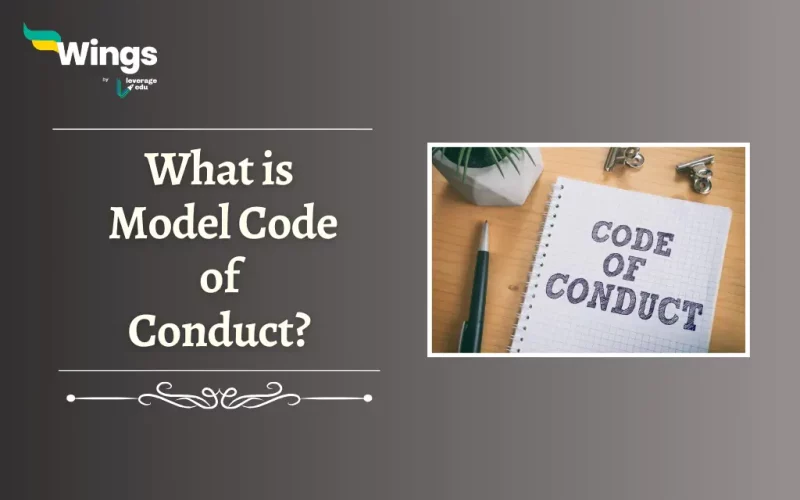The Model Code of Conduct (MCC) in India is a set of guidelines by the Election Commission of India (ECI) for political parties and candidates during the time of elections. It aims to guarantee free and fair elections by regulating the conduct of political parties and candidates. Furthermore, the MCC lays down the standards of behaviour and activities for political parties and the candidates from the time elections are announced until the results are declared. For the 2024 elections, the Model Code of Conduct came into effect on the 16th of March, 2024. Read on to know why is Model Code of Conduct required in a Democracy, whether it is legally binding and the issues with the MCC!
Table of Contents [show]
What is Model Code of Conduct Ethics?
Furthermore, here are some of the Provisions of the MCC:
Processions and Meetings
Parties are required to inform local police authorities about the location and schedule of any gatherings so that appropriate security measures can be arranged.
- If multiple candidates intend to hold processions on the same route, the political parties must coordinate beforehand to avoid any conflicts.
- Additionally, it is prohibited to carry and burn images of members from other political parties.
General Conduct Guidelines
No party or candidate shall engage in activities that could worsen existing divisions or create tension between different castes, communities, religions, or linguistic groups.
- At the same time, Section 123(3) of the Representation of the People Act of 1951, prohibits the use of religion, race, caste, community, or language to start hate among people or as a political strategy.
- Moreover, criticisms of other political parties should be limited to evaluating their policies, historical actions, and initiatives, avoiding personal attacks.
Power of the Party in Power
In 1979, the MCC introduced specific restrictions to regulate the conduct of the ruling party.
- These guidelines specify that ministers should not combine official visits with election activities or utilise government machinery for electoral purposes.
Day of Polling
Only voters and people with a valid pass from the Election Commission are permitted to enter polling stations.
- Authorized party workers at these locations must be provided with appropriate badges or identity cards.
- Identity slips issued by party workers to voters must be on plain white paper, without any symbols, candidate names, or party names.
- The Election Commission will appoint observers, and candidates can report any issues related to the election conduct to these observers.
Also Read: Who Was The First Chief Election Commissioner Of India?
Why is a Model Code of Conduct required in a Democracy?
In addition, here is why the Model Code of Conduct is required in a Democracy:
- Guaranteeing Fair Elections: The MCC guarantees that the electoral process stays free from influence, intimidation, and malpractice.
- Hence, through the MCC it wants to have an equal playing field for all candidates.
- Preventing Abuse of Power: During elections, there is a heightened risk of those in power to abuse their positions for electoral gains.
- Therefore, the MCC checks on the ruling party’s actions, thus stopping them from exploiting the resources of the government to their advantage.
- Maintaining Electoral Integrity: The MCC helps in keeping the integrity by prohibiting activities that could alter the fairness of elections, such as distributing money or gifts to voters.
Also Read: Representation of People’s Act
Is Model Code of Conduct Legally Binding?
The Model Code of Conduct developed by the Election Commission of India is not legally binding. Hence this means that the violations cannot lead to any legal action.
- Moreover, compliance with the MCC is voluntary, with the ECI using moral pressure for enforcement.
- Nevertheless, if the ECI suspects a breach, it can issue a notice to the person or party. This can either be done on its own or based on a complaint.
- Additionally, the recipient must then respond in writing, thus admitting to their fault with an apology or denying the accusation.
- If found guilty afterwards, they may receive a written censure which is considered by many as a mild punishment.
Also Read: Notes on Lok Sabha
Issues with the MCC
Furthermore, the issues with the Model Code of Conduct are as follows:
- Lack of Statutory Backing: Since the MCC is not a law passed by Parliament, its enforcement depends mostly on the willingness of political parties and candidates to comply with it.
- Limited Scope: The MCC focuses on the conduct of political parties and candidates during elections. However, it does not manage problems such as hate speech or misinformation, which also influences the electoral process.
- Enforcement Challenges: The vastness of the electoral landscape in India has substantial challenges. Moreover, the ECI’s resources might be stretched thin during election periods. Thus impacting its ability to effectively monitor and implement the MCC.
Related Blogs
Lastly, we hope you liked our blog and gained an understanding of What is Model Code of Conduct. Moreover, you may even read more blogs and empower yourself with knowledge regarding Civics and Polity!
 One app for all your study abroad needs
One app for all your study abroad needs















 45,000+ students trusted us with their dreams. Take the first step today!
45,000+ students trusted us with their dreams. Take the first step today!
